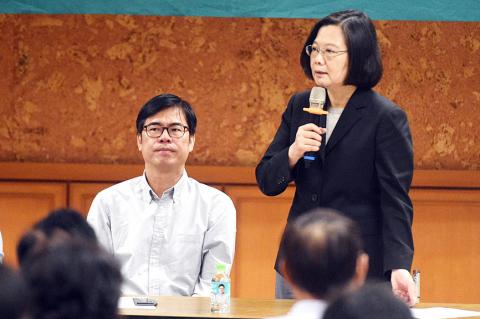President Tsai Ing-wen (蔡英文) yesterday apologized for letting her administration become a burden on Democratic Progressive Party (DPP) candidates in Saturday’s local elections, as she embarked on a series of trips across the nation to gather opinions from the party’s frontline campaign staff.
Tsai, who on Saturday evening resigned as DPP chairperson over the party’s losses, made the remarks at a Kaohsiung forum attended by members of a fan club for DPP Kaohsiung mayoral candidate Chen Chi-mai (陳其邁), who lost to his Chinese Nationalist Party (KMT) rival Han Kuo-yu (韓國瑜).
Chen’s loss ended the DPP’s 20-year governance of the city, which has traditionally been a pan-green camp stronghold.

Photo: Chang Chung-yi, Taipei Times
Kaohsiung is one of the seven cities and the counties the DPP lost in the local elections. The party had won 13 cities and counties in the 2014 race.
“I would like first to apologize to you for letting the central government become a burden on local elections. I am here today to join you to identify and reflect on our mistakes,” Tsai said.
Elections are the cornerstone of democracy and are used by voters to evaluate a nation’s leaders, which is why post-election reflection is an important task that allows the defeated party to find where it had failed and where it should pick itself up again, Tsai said.
Following reflection, Tsai said she would readjust her policies on the issues covered by the referendums and reshuffle her government.
“Tomorrow [today], the DPP will choose its interim chairperson. It will also elect a new leader as soon as possible to lead the DPP in the next phase,” she said.
The DPP would bear in mind all the criticism Kaohsiung residents have voiced and humbly listen to their opinions, Chen said.
Despite his defeat, Chen said he still loves his hometown and believes in democracy and the progressive values upheld by its residents.
Earlier yesterday, Tsai wrote on Facebook that reflection should not be done by shutting oneself in a room, but rather should be acted on so that the DPP can regroup and start again.
As Taiwanese have expressed their discontent with the ruling party through their ballots, she must humbly listen to their opinions, Tsai said.
“Starting today, I will begin a series of events and go to the front lines to listen to your opinions,” she added.
Taoyuan Mayor Cheng Wen-tsan (鄭文燦), a DPP member who was re-elected on Saturday, yesterday said that he told Tsai on Monday that she needed to reshuffle not only the party, but also the Presidential Office and the Executive Yuan.
The DPP should make drastic changes to respond to the public’s discontent with the party, and not just reflect on its campaign strategies and carry out party reform, Cheng said.
It is the only way the DPP can regain the public’s trust, he said.
Additional reporting by Wei Ching-yun

AGING: As of last month, people aged 65 or older accounted for 20.06 percent of the total population and the number of couples who got married fell by 18,685 from 2024 Taiwan has surpassed South Korea as the country least willing to have children, with an annual crude birthrate of 4.62 per 1,000 people, Ministry of the Interior data showed yesterday. The nation was previously ranked the second-lowest country in terms of total fertility rate, or the average number of children a woman has in her lifetime. However, South Korea’s fertility rate began to recover from 2023, with total fertility rate rising from 0.72 and estimated to reach 0.82 to 0.85 by last year, and the crude birthrate projected at 6.7 per 1,000 people. Japan’s crude birthrate was projected to fall below six,

US President Donald Trump in an interview with the New York Times published on Thursday said that “it’s up to” Chinese President Xi Jinping (習近平) what China does on Taiwan, but that he would be “very unhappy” with a change in the “status quo.” “He [Xi] considers it to be a part of China, and that’s up to him what he’s going to be doing, but I’ve expressed to him that I would be very unhappy if he did that, and I don’t think he’ll do that. I hope he doesn’t do that,” Trump said. Trump made the comments in the context

SELF-DEFENSE: Tokyo has accelerated its spending goal and its defense minister said the nation needs to discuss whether it should develop nuclear-powered submarines China is ramping up objections to what it sees as Japan’s desire to acquire nuclear weapons, despite Tokyo’s longstanding renunciation of such arms, deepening another fissure in the two neighbors’ increasingly tense ties. In what appears to be a concerted effort, China’s foreign and defense ministries issued statements on Thursday condemning alleged remilitarism efforts by Tokyo. The remarks came as two of the country’s top think tanks jointly issued a 29-page report framing actions by “right-wing forces” in Japan as posing a “serious threat” to world peace. While that report did not define “right-wing forces,” the Chinese Ministry of Foreign Affairs was

PREPAREDNESS: Given the difficulty of importing ammunition during wartime, the Ministry of National Defense said it would prioritize ‘coproduction’ partnerships A newly formed unit of the Marine Corps tasked with land-based security operations has recently replaced its aging, domestically produced rifles with more advanced, US-made M4A1 rifles, a source said yesterday. The unnamed source familiar with the matter said the First Security Battalion of the Marine Corps’ Air Defense and Base Guard Group has replaced its older T65K2 rifles, which have been in service since the late 1980s, with the newly received M4A1s. The source did not say exactly when the upgrade took place or how many M4A1s were issued to the battalion. The confirmation came after Chinese-language media reported